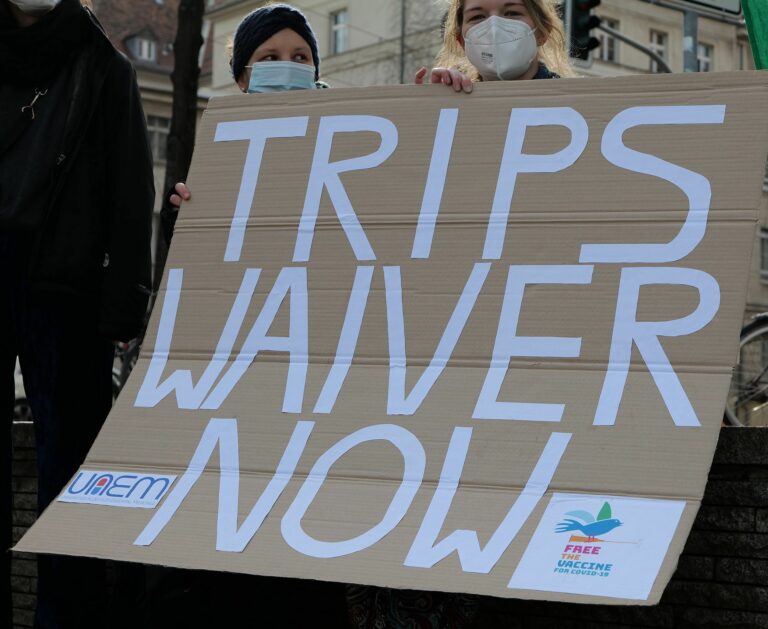TRIPS Waiver
- Founded
- First proposal: October 2020; revised proposal: May 2021; WTO decision: June 2022.
- Governance
- World Trade Organization (WTO)
- Funding
- Not applicable.
- Description
The Agreement on Trade-Related Aspects of Intellectual Property Rights (TRIPS) sets out minimum standards all member states of the World Trade Organization (WTO) must provide to protect intellectual property rights on novel innovations. In order to enhance global, equal access to medical products against Covid-19, in October 2020, the governments of India and South Africa proposed a so-called TRIPS Waiver.
The objective of this original TRIPS Waiver proposal was to ensure that certain obligations of the member states to protect intellectual property on Covid-19 related innovations, would be temporarily removed upon adoption by the WTO. Through this ceding of important intellectual property barriers, pharmaceutical companies that do not hold the patent rights can be allowed to use, produce and sell Covid-19 related innovations too – without fear of legal repercussions.
The proposal provoked both support and opposition. That it was also received with considerable acclaim is evident, as 65 WTO member states were co-sponsors while 105 other members expressed support. The opposition mainly came from the pharmaceutical industry and higher-income countries, where access has been significantly less of a problem due to their financial power and the residence of pharmaceutical companies within their territories.
The conflicting views resulted in a long time of discussions and negotiations. Finally, on 17 June 2022, during the 12th WTO Ministerial Conference (MC12), the Ministerial decision on the Trade-Related Aspects of Intellectual Property Rights (TRIPS) Agreement, aka the TRIPS Waiver, was a fact.
The decision entails a strongly watered-down version of the original TRIPS Waiver drafted by India and South Africa. It only covers vaccines and no other Covid-19 related medical products. This will be up for reconsideration within six months after the decision. Instead of the originally proposed waiving of 35 TRIPS provisions, the decision only waves one provision, Article 31 (f), allowing the export of vaccines under a compulsory license. Lastly, the duration of the decision is limited to five years.

Strengths
- Has resparked the discussion on what level of intellectual property protection is desirable for medical products in health crises.
- The discussions at WTO level can be considered as a recognition of inadequacy of TRIPS in pursuing affordable access for all.
- WTO decision could accelerate up-scaling of global production capacity of Covid-19 vaccines in countries experiencing intellectual property barriers and (plan to) produce vaccines for domestic use and export most of them.
Weaknesses
- WTO decision does not stimulate structural change.
- WTO decision does not address transfer of know-how and technology needed to safely and effectively scale-up production in the fastest way possible.
- WTO decision is limited to vaccines and thus does not include other key medical products, such as treatments and diagnostics.
- WTO decision is not a proper recognition of intellectual property rights as a barrier for increased production capacity of key medical products.
- WTO decision can be considered as a prioritisation of economical interests of high-income countries over global health equity.
- There is a risk that the decision will function as blueprint for pandemic accord negotiations, compromising meaningful provisions to achieve equitable access to medical products in future frameworks.
- Free Trade Agreements some countries have concluded, may hinder the full impact of the WTO decision.
Review
The entire TRIPS Waiver negotiation process was a manifestation of shared dissatisfaction with TRIPS. As such, the negotiations provided fertile ground to rethink the agreement in light of access to health innovations.
However, the result of the negotiations is nowhere near the objectives determined by India and South Africa. The WTO decision barely waives provisions and merely repeats or clarifies existing options for overriding patents by compulsory licensing. It neglects essential aspects for improved access to medical products, has a limited duration (five years) and only covers vaccines and no other key medical products.
Another important aspect to note is that solely addressing patents is not enough. To be able to manufacture and market (for instance) vaccines, with assured quality built in, it is a neccessity to acquire much more information than included in patents. Information on processes, machineries, quality contol standards, etc. is vital to assure products that meet safety and effectivity requirements and have them marketed timely. This requires transfer of technology and know-how, but this is rather difficult to enforce (through, for example, compulsory licensing or waiving TRIPS provisions) and is likely to be more effective on a voluntary basis.
The WTO decision shows that commercial interests of high-income countries have prevailed over the objective to support equitable access to Covid-19 innovations. The initial proposal by India and South-Africa aimed at improving the power imbalance between governments and pharmaceutical companies, but also between high-income countries and low- and middle-income countries. The WTO decision does not contribute in any substantial way to either goal.
Nonetheless, some national governments are expected to may benefit from the WTO decision. Among them are those that are confronted with existing or potential intellectual property barriers, which are (planning on) producing vaccines for domestic use and export the majority of them. It would be highly beneficial to expand the scope of the decision to diagnostics and therapeutics too.